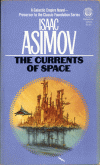Almost three years ago I set out on a massive project to read all 36 of the books in the Robot and Foundation Universe. The main thing that prompted me to start this project was an eBay auction that had a specific book I was looking for (The End of Eternity, which is loosely connected to this project) and several other books which I’ve already read. I purchased about 16 books in a lot for about $35 total. After finding this deal I decided to try and purchase every book in the series, which I eventually accomplished.
After reading the first few books I discovered that I only remembered a few main facts about these books that I have read many years before. I guess I should state that I had already read 80% of the books in this series before, but in order of publish, not chronologically. I was amazed that a book I’ve read before could be so pleasing to read again, almost like it was a new experience. The main difference was that I knew the overall plot, and could focus on the vague details that made these books so attractive.
Partway through the beginning of my project, I realized how much work I was doing, and didn’t want to ever forget or lose this experience. I started taking detailed notes about the plot and themes in the novels. Eventually I decided to register this domain and dedicate my time to creating reviews to publish. The timeline that I was basing my reading off of was completed by Johnny Pez, which graciously gave me permission to update and host here on The Science Fiction Review.
I’ve tried my hardest to keep major spoilers out of my reviews, but have kept detailed notes on most of my readings so that I could return to them at a later time to discuss things that hopefully someone that has read these books could appreciate. I think that anyone would benefit from what I hope to write in the next few months, but it would be a shame to spoil the story for anyone.
I plan to do a multi-part series of entries that discuss the main parts of this series that drew me back in for a second time. I’ll also try to explain why I think that if anyone was to read the series just ONE time, it should be chronologically, rather than in order of publish. I think that if anyone would be able to make that recommendation, it should be me.


